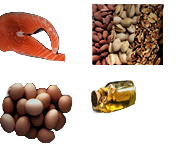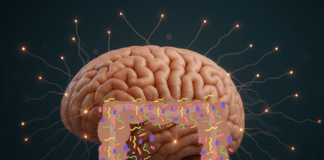Attention deficit hyperactivity disorder (ADHD) is a common psychiatric disorder characterized by behaviour problems, mood shifts, anxiety, and often use of substances. Untreated ADHD has not only been confined to the victim but also has a prodigious influence on society, such as compromised relationships, irregularity at work and school, road accidents and substance use may have a negative impact on the economic growth of the society as a whole. Due to the side effects of conventional medicines plus poor response of around 40% of patients towards these medicines, nutritional supplementation has gained more attention as an alternative treatment.
We know that our brain is 50% fat, comprising mainly cholesterol and phospholipids (including phosphatidylcholine, phosphatidylethanolamine and sphingolipids). Thus, fatty acids are among the most essential molecules required to maintain the integrity and performance of brain. Clinical studies have demonstrated that essential fatty acids, particularly omega-3 fatty acids-docosahexaenoic acid (DHA) and eicosapentaenoic acid (EPA) are essential for growth of brain in prenatal and post- natal phases and their deficiency may impair brain development. Moreover, their deficiency may result in depression, mood disparity and cognitive imbalance due to abnormal transmission of serotonin,norepinephrine, and dopamine. One recent meta-analysis has shown that children with ADHD are deficient in DHA, EPA compared to normal ones and supplementation of diet with DHA, EPA improved symptoms of depression and ADHD. Based on several studies, it is recommended for ADHD patients to have at least 1g fish oil/day and every normal person (particularly pregnant women) to eat fatty fish (such as salmon) twice a week for health brain function.
What about Omega-6?

Owing to the increased consumption of omega-6 rich refined oils such as soybean, corn, and safflower oil (having an omega-6/3 ratio > 50:1) for decades, the ratio of omega-6/3 in the diet has increased. Omega-6 are more vulnerable to oxidation in refined oils compared to whole foods containing omega-6, for example, marine food, nuts, seeds and eggs. Thus increase in the omega-6/3 ratio has increased inflammatory, and allergic diseases. Omega-3s lower inflammation whereas omega-6 polyunsaturated fatty acids increase inflammation. Numerous studies support an association between ADHD and inflammation, supplementation of foods with omega-3s could, therefore, be one of the potential ways to deal with ADHD.
Vitamins, Minerals and ADHD
Besides omega-3s, studies have also witnessed lower vitamin D and magnesium in children with ADHD. Further, studies also confirmed that vitamin D fortification improved cognitive functions in patients with ADHD. Vitamin D regulates hormonal and serotonin pathways in the central nervous system and dopamine levels in the brain. Similarly, magnesium supplementation is helpful in dealing with anxiety, aggression, and attention deficit. Magnesium is known to play a vital role as cofactor of enzymes responsible for conversion of essential fatty acids to long-chain omega-3 and omega-6 fatty acids. Therefore, deficiency of magnesium may lead to brain dysfunction.
This investigation of the level of vitamin B9 and B12 in children with ADHD showed that both these vitamins were significantly lower than in the healthy children. Also, folate deficiency during pregnancy has been linked to slow development, cognitive impairment and decreased memory function are associated with brain folate deficiency due to lack in folate transfer to the fetal nervous system. Folate is involved in metabolism of homocysteine, its deficiency results in hyper-homocysteinemia, a possible cause of ADHD. In addition, the efficient working of the folate cycle is necessary for regeneration of tetrahydrobiopterin (cofactor of enzymes that convert amino acids to neurotransmitters- serotonin, melatonin, dopamine and epinephrine). Since vitamin B12 plays a key role in brain development and nerve myelination, its deficiency may result in cognitive impairments.
Some studies have found an association between diet composition and ADHD; higher consumption of sugar, fried foods, and salt has been shown to be positively associated with ADHD. Since ADHD children are impatient, they usually prefer to have non-nutritive food that could provide quick satisfaction and pleasure. Also, lower intake of vegetables, fruits, protein-rich foods results in folate, B12 and minerals deficiency. The imbalance in omega-6 to omega-3 fatty cannot be ignored at all while associating diet profile with ADHD.
Thus, supplementation with omega-3 fatty acids, vitamins (D,B9, B12), zinc, iron, and magnesium could improve ADHD symptoms.
Further readings
- Omega-6 to Omega-3 Fatty Acid Ratio in Patients with ADHD: A Meta-Analysis
- Do Omega-3/6 Fatty Acids Have a Therapeutic Role in Children and Young People with ADHD?
- Personalised medicine in child and Adolescent Psychiatry: Focus on omega-3 polyunsaturated fatty acids and ADHD
- Essential fatty acids and human brain
- Brain lipidomics: From functional landscape to clinical significance
- The Importance of Maintaining a Low Omega-6/Omega-3 Ratio for Reducing the Risk of Autoimmune Diseases, Asthma, and Allergies




